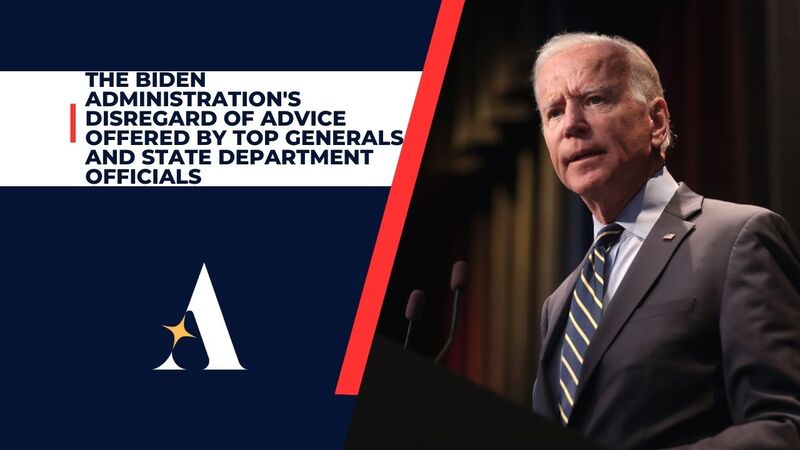This 113-page missive draws from open source records, news reports and interviews with officials and whistleblowers to reveal that President Biden ignored recommendations by top military advisers like Joint Chiefs Chairman Gen. Mark Milley and U.S. Central Command commander Gen Kenneth McKenzie.
They demanded that his withdrawal be contingent upon reaching an agreement, but he declined, leading to an incoherent evacuation and Taliban takeover that resulted in 13 U.S. servicemember deaths.
Why Did Biden Ignore Advice?
As President Biden initiates the US withdrawal from Afghanistan, officials are grappling with why he went against advice of top military advisors. White House spokeswoman Jen Psaki noted last week in a press conference that President Biden welcomed advice, yet at times disagreed, about what path forward should be followed.
But the US military advice was clear: an unconditional withdrawal would undo any gains made over two decades, diminish the chance of peace negotiations, and lead to Taliban takeover. Furthermore, an unconditional pullout risked alienating voters while providing al-Qaeda and other terrorist groups an opportunity to use Afghanistan as a launchpad against America.
Military leaders warned privately of the risks involved with withdrawing from Afghanistan, but were overruled by Biden who was determined to end America’s longest war, according to a forthcoming book by Bob Woodward and Robert Costa. Their advice included maintaining residual forces as well as an extended timelineframe for withdrawing them from service.
The Costs of the Unconditional Withdrawal
The US is left confronting an unpredictable new reality in Afghanistan as Taliban terrorists gain ground quickly and security rapidly deteriorates. Our hasty withdrawal denied America the opportunity to impose costs on the Taliban while simultaneously handing billions worth of American military equipment over to our enemies as our troops were forced to leave without resistance.
The Biden administration’s disregard of advice offered by top generals and State Department officials deprives Americans of an opportunity to protect their families in Afghanistan, secure bases for intelligence gathering and counterterrorism operations, and prevent terrorists from using Afghan territory as a launch pad against America. The HFAC minority report calls upon the State Department to release all pertinent documents, transcripts of interviews, or other material which might shed light on this major mistake; attempts made by committee minority to gain this information from them have met considerable resistance.

The Long-Term Impact
Biden insists he has not received military advice to keep troops in Afghanistan, yet top commanders like Gen. Frank McKenzie and Gen. Mark Milley have testified they urged him to keep at least a limited advisory and counterterrorism mission in place.
Maintaining a light footprint with air support limited only against terrorists rather than Taliban forces would have made it much harder for the Taliban to push out Afghan government representatives, while providing Americans with a clearer idea of future troop levels and their impact on war’s outcome.
The Biden administration’s Afghan debacle has sent an unfortunate signal to America’s allies around the globe and terrorists, who have promised to exploit our weakness. Chinese President Xi Jinping saw this as an invitation to invade Ukraine while Vladimir Putin’s Russia has used it as an excuse to threaten Taiwan and fund terror from West Bank to Yemen.
The Short-Term Impact
As the withdrawal date approaches, the Biden administration has come under criticism for failing to adequately prepare for the laborious task of evacuating Afghans who assisted U.S. forces and risked their lives – many have fled into neighboring countries like Iran as the withdrawal date approaches.
Khalilzad has made it clear that he believed the United States could gain leverage by setting conditions on withdrawal, but did not want to risk the security situation deteriorating further. But as the war draws nearer its end, these leverage points are rapidly disappearing as Taliban gains gain more territory across Afghanistan.
Though President Obama’s strategy failed, that doesn’t mean his successor, Joe Biden’s administration, should ignore advice and push ahead with plans that may destabilize the nation. Instead, they should emphasize the necessity of responsible withdrawal while renewing relationships with NATO allies who count on America for stabilization of their home countries.
- Friday Intraday Trading Sees Nvidia’s stock Market Cap Momentarily Cross $2 Trillion
- Trump’s January 6 Civil Cases Proceed While Criminal Case Is Halted
- Trump Delivers Speech at the Columbia Black Conservative Federation Gala
- Trump Declares Strong Support for IVF Following Alabama Supreme Court Decision
- Schumer in Ukraine Declares US Backing During House Aid Standoff






